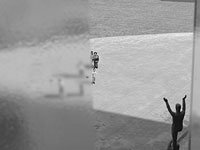David Claerbout
dal 1/10/2007 al 6/1/2008
Segnalato da
1/10/2007
David Claerbout
Centre Pompidou, Paris
Claerbout blurs the line between the still and the moving image, digitally manipulating analogue images to create works that invite a reconsideration both of the image and of our perceptions of space and time. Inspired both by phenomenology and by Gilles Deleuze's writings on The Time-Image and The Movement-Image (1983), he has developed a photography in movement, a "moving still" - into which, since 2004, he has introduced narrative elements.

Solo show
curated by Christine Van Assche
Following exhibitions devoted to Stan Douglas in 1994, Johan Grimonprez in 1997,
James Coleman in 1996, Pierre Huyghe in 2000, Ugo Rondinone in 2003 and Isaac Julien
in 2005, the Centre Pompidou's Department of New Media presents the work of Belgian
artist David Claerbout, born in Courtrai in 1969.
Claerbout blurs the line between the still and the moving image, digitally
manipulating analogue images to create works that invite a reconsideration both of
the image and of our perceptions of space and time. After Paris, the exhibition
travels to the MIT List Center in Cambridge (February-April 2008), the Kunstmuseum
St Gallen (May-June 2008) and the Belkin Galleries, UBC, Vancouver (Autumn 2008),
and then to the De Pont Foundation, Tilburg, and the Metropolitan Museum of
Photography, Tokyo, in 2009.
Since 1996, Claerbout's works have navigated between the still and the moving image,
between photographic and digital techniques. Inspired both by phenomenology and by
Gilles Deleuze's writings on The Time-Image and The Movement-Image (1983), he has
developed a photography in movement, a moving still -- into which, since
2004, he has introduced narrative elements.
The 300-square-metre exhibition space is shared by five projected works: The Stack,
2002, Bordeaux Piece, 2004, and the Shadow Piece of 2005,together with two new
works, Sections of A Happy Moment and Long Goodbye, both 2007. Filmed in
architectural settings representative of modern culture and the contemporary urban
context, they explore the passage of time and the unfolding of space.
Bordeaux Piece -- acquired by the Centre Pompidou for the collection of the
Musee National d'Art Moderne -- thus makes use of a magnificent villa on the
outskirts of Bordeaux as a tool for a conceptual approach to space-time, a minutely
introspective examination of time in a deconstructed space.
Visitors are invited to take their time in moving through the specially designed
exhibition space, its half-light permitting a liberty forbidden in the cinema and
allowing a dialogue to emerge between the works.
In many of my works over the past ten years both time and space have developed
into anchors of my videographic production. In a mode of production where
photographic reality is increasingly preconceived, filmic duration seems to be the
last man standing from an 'analogue' past.
Occupied with both the artificiality and flatness of anything on screen or print, I
have often taken recourse to architectural photography as a way of defining space in
what I would call the terrible flatness of film.
Centre Pompidou
Place Georges Pompidou - Paris



